|
|
|
Sort Order |
|
|
|
Items / Page
|
|
|
|
|
|
|
| Srl | Item |
| 1 |
ID:
087492
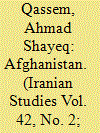

|
|
|
|
|
| Publication |
2009.
|
| Summary/Abstract |
More than seven years have passed since the intervention of the international community in Afghanistan, yet the country has not only failed to achieve stability; it has actually experienced a downward trend on that account. The worsening situation in Afghanistan has occurred despite the fact that the Afghan government and its international partners have allocated unprecedented amounts of resources, increased their security forces and implemented socio-political and economic programs that they deemed were conducive to stability. Why and how this failure did come about? This article challenges some of the underlying assumptions for stability and the notion of political reconstruction that the international community and the Afghan government have implemented so far as being largely responsible for the gloomy state of affairs in that country.
|
|
|
|
|
|
|
|
|
|
|
|
|
|
|
|
| 2 |
ID:
087423
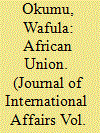

|
|
|
|
|
| Publication |
2009.
|
| Summary/Abstract |
As the African Union (AU) moves toward its tenth anniversary in 2012, it is drawing a great deal of attention to its handling of mounting crises that test its commitment. Across the continent, the AU is faced with crises that test its commitment and capability to fulfill the ambitious agenda it adopted at its formation in 2002.
|
|
|
|
|
|
|
|
|
|
|
|
|
|
|
|
| 3 |
ID:
041776
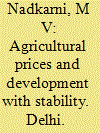

|
|
|
|
|
| Publication |
DelhI, National Publishing House, 1973.
|
| Description |
xiv, 355p.
|
|
|
|
|
|
|
|
|
|
|
|
Copies: C:1/I:0,R:0,Q:0
Circulation
| Accession# | Call# | Current Location | Status | Policy | Location |
| 011356 | 338.130954/NAD 011356 | Main | On Shelf | General | |
|
|
|
|
| 4 |
ID:
151445
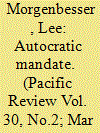

|
|
|
|
|
| Summary/Abstract |
This paper explains how authoritarian regimes employ flawed elections to obtain both short-term legitimacy and long-term stability. In conjunction with the use of co-optation and repression, it argues that ruling parties hold de jure competitive elections to claim what is termed autonomous legitimation. This denotes the feigning of conformity to the established rules of the constitution and the shared beliefs of citizens. Regardless of overall turnout and support, ruling parties exploit the normative and symbolic value of elections in order to establish moral grounds for compliance within a dominant-subordinate relationship. In support of this argument, the case of Singapore's People's Action Party (PAP) is analysed in historical and contemporary terms. Since 1959, the PAP has used precisely timed elections to extract one or more mandate types from citizens and, by extension, claim legitimacy. In particular, it has sort a mandate based on its response to an event, execution of a policy and/or collection of a reward. In the long run, autocratic stability has been achieved through a process of reciprocal reinforcement, which has combined autonomous legitimation with targeted co-optation and low intensity coercion. The paper concludes by addressing the generalisability of this finding for other authoritarian regimes in Southeast Asia.
|
|
|
|
|
|
|
|
|
|
|
|
|
|
|
|
| 5 |
ID:
088407
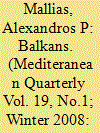

|
|
|
|
|
| Publication |
2008.
|
| Summary/Abstract |
The author, the Greek ambassador to the United States, argues that the Balkan countries have made significant strides in economic and security stabilization over the past decade but points to particular challenges, notably in Kosovo and the Former Yugoslav Republic of Macedonia (FYROM). He argues that conditions in both countries remain volatile and that any solutions must come in the context of relations with European neighbors and within the frameworks of existing treaties and policies. He describes how Greece has contributed to economic development in the region in hopes of stabilizing the it as part of the wider European and international communities and argues that actions by FYROM jeopardize its relationship with international organizations and thus pose a threat to stability in the region.
|
|
|
|
|
|
|
|
|
|
|
|
|
|
|
|
| 6 |
ID:
152472
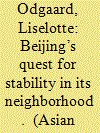

|
|
|
|
|
| Summary/Abstract |
Using the English school arguments that inter-state regulation ameliorates the consequences of the power politics of international anarchy, I analyze to what extent China pursues a strategic partnership with Russia in Central Asia. I investigate if China has compatible policies with Russia on the use of force, on international legitimacy, and on institutional frameworks for security management. As China is increasingly asserting its security, economic, and institutional interests in Central Asia, similarities and differences have become apparent in relations with Russia. Increased mutual concern for continued regional stability has encouraged Beijing and Moscow to coordinate their policies across a wide range of issue areas. Stability allows them to focus attention and resources on each of their different geostrategic priorities.
|
|
|
|
|
|
|
|
|
|
|
|
|
|
|
|
| 7 |
ID:
172479
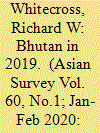

|
|
|
|
|
| Summary/Abstract |
Bhutan in 2019 was dominated by the change of government in late 2018, better diplomatic relations with India, and cultivation of relations with China. The economy was strong, with the country due to graduate from least developed country status in 2023, though unemployment is a concern.
|
|
|
|
|
|
|
|
|
|
|
|
|
|
|
|
| 8 |
ID:
103238


|
|
|
| 9 |
ID:
114689
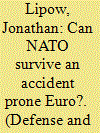

|
|
|
|
|
| Publication |
2012.
|
| Summary/Abstract |
The European Monetary Union (EMU) is inherently unstable, and will be prone to repeated financial and fiscal crises. These crises pose a clear threat to NATO security and the political institutions of Alliance member states. There is no definitive way to eliminate the risks posed by monetary union, but straightforward reforms in EMU sovereign debt management represent a low-cost near-term means of mitigating these risks. With EMU nations facing a seeming leadership vacuum, it is well within NATO purview to press for adoption of such reforms.
|
|
|
|
|
|
|
|
|
|
|
|
|
|
|
|
| 10 |
ID:
121755
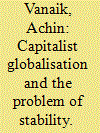

|
|
|
|
|
| Publication |
2013.
|
| Summary/Abstract |
Ever-expanding capital accumulation cannot be stable or cumulative without coordination and regulation provided by the state and the system of states, wherein the subset of the most powerful states is vital for establishing stability. There is a hegemonic transition of sorts towards a new quintet of powers in which the USA will remain indispensable as the key coordinator. Pretensions regarding China as the new hegemon are exposed as also are Indian claims. Moreover, it is argued that the brics grouping cannot provide an effective alternative to the quintet. However, the likely failure of the quintet to guarantee future stability raises the issue of the viability of capitalism itself. Transiting towards a post-capitalist order requires as a necessary if insufficient condition confronting the informal empire project of the USA that underpins capitalist globalisation.
|
|
|
|
|
|
|
|
|
|
|
|
|
|
|
|
| 11 |
ID:
082113
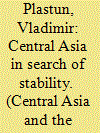

|
|
|
| 12 |
ID:
113972
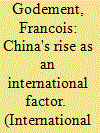

|
|
|
|
|
| Publication |
2012.
|
| Summary/Abstract |
The term 'peaceful development' has created ambiguity. It fails to capture the extent to which China has become a global influence whose economic policy decisions are essential to the world multilateral system. China's international strategy can no longer be guided only by the quest for 'stability' and by the principle of non-interference, because change and interdependence are a hallmark of this century. Neither can a relationship with the United States alone define China's international strategy. Hopefully, China will understand the usefulness for rising powers of making long-lasting compromises, and it will strengthen instead of weaken a set of international institutions that have allowed for the most prosperous and peaceful era in human history.
|
|
|
|
|
|
|
|
|
|
|
|
|
|
|
|
| 13 |
ID:
097239
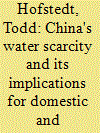

|
|
|
| 14 |
ID:
149256
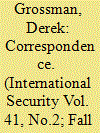

|
|
|
| 15 |
ID:
133712


|
|
|
|
|
| Publication |
2014.
|
| Summary/Abstract |
A long-standing research tradition on political culture argues that greater support for core liberal values leads to a rejection of destructive political activities and reduced support for violent politics. In this vein, many contemporary analysts of security policy contend that a lack of democratic values in the Middle East promotes the development of violent political organizations. Unfortunately, there have been few direct tests of the hypothesis that an individual's rejection of democratic values correlates with support for militant groups. We conduct such a test in Pakistan using an original 6,000-person provincially representative survey. We find that strong supporters of democratic values are actually more supportive of militant groups and that this relationship is strongest among those who believe that Muslim rights and sovereignty are being violated in Kashmir. This is consistent with the context of Pakistani politics, where many militant groups use the principle of azadi (i.e., freedom and self-determination) to justify their actions. These results challenge the conventional wisdom about the roots of militancy and underscore the importance of understanding how local context mediates the influence of civic culture on political stability and violence.
|
|
|
|
|
|
|
|
|
|
|
|
|
|
|
|
| 16 |
ID:
121731
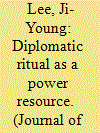

|
|
|
|
|
| Publication |
2013.
|
| Summary/Abstract |
What explains Korea's success in surviving as an independent state for over 2,000 years, not annexed to China, when it shares a border with this powerful imperial neighbor? I argue that diplomatic ritual can be conducive to managing asymmetric power relations and that the Korean state and the Chinese state prior to the nineteenth century used the diplomatic ritual of investiture in a strategic manner as a signaling mechanism to manage the expectations of each side. Drawing insights from ritual studies, I offer three specific mechanisms: (1) regularity and precision, (2) strategic ambiguity, and (3) the manipulation of symbols, through which the ritualization of power relations reduces the tension arising from the disparity in power. The empirical evidence comes from an investigation of a total of sixteen investiture cases between Choso n Korea and Ming China between 1392 and 1644. It shows that the granting and seeking of investiture on both sides was not only a way of signaling their commitment to the status quo, but also a medium of negative soft power through which the stronger side could change the status quo relations to its favor using the symbolic power embedded in the investiture ritual.
|
|
|
|
|
|
|
|
|
|
|
|
|
|
|
|
| 17 |
ID:
187390


|
|
|
|
|
| Summary/Abstract |
Research on postwar peace focuses primarily on how elites and institutions can prevent relapse into civil war. In line with this special issue’s focus on citizens’ experiences, we take a micro-level approach to explore peace beyond the absence of war. We investigate how members of opposing sides experience peace a decade after a decisive victory of the majority. Using original survey data from a representative sample of 2000 respondents in 2018 Sri Lanka, we find that even one decade after the conflict members of the Sinhalese winning majority are consistently more likely to report improvements in peace than Tamils, who were represented by the defeated minority. But the benefit of a “victor’s peace” does not seem to translate into an optimistic outlook of the victorious group, nor does it increase people’s endorsement for repressive state measures. Despite the drastically improved physical security for the defeated ethnic minority since the war, they experience a deterioration in other dimensions of peace. Our findings have important implications for a deeper understanding of variations in peace and reconciliation processes.
|
|
|
|
|
|
|
|
|
|
|
|
|
|
|
|
| 18 |
ID:
170917
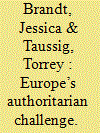

|
|
|
| 19 |
ID:
122457
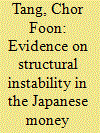

|
|
|
|
|
| Publication |
2013.
|
| Summary/Abstract |
The main purpose of this study is to re-investigate the long-run Japanese M2 money demand function and its stability over the period of 1970:Q1 to 2010:Q4. This study uses the bounds testing approach to cointegration within the autoregressive distributed lag (ARDL) framework to examine the presence of a cointegration relationship. The rolling regression procedure is then incorporated into the ARDL cointegration test to investigate the stability of the cointegrating relationship between money demand and its determinants in Japan. With the full sample, this study confirms that real M2 money demand, real income, real interest rates and real exchange rates are cointegrated. However, the evidence of the rolling ARDL cointegration test implies that the cointegrating relationships are not stable over time, indicating that the Japanese M2 money demand function is also unstable. In line with the rolling ARDL cointegration results, the recursive Chow breakpoint F-test and the Quandt likelihood ratio (QLR) test also suggest the same instability outcome.
|
|
|
|
|
|
|
|
|
|
|
|
|
|
|
|
| 20 |
ID:
190360
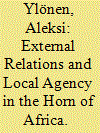

|
|
|
|
|
| Summary/Abstract |
Strategic and security analysis of the Horn of Africa systematically portrays the roots of instability as external. However, the region’s stability or instability is largely determined by local actors and conditions. Local agency and context largely set the conditions for the involvement of external actors. This article discusses how state and nonstate actors have conducted their engagement with outside powers, especially the Gulf states, at a time of increasing rivalry for influence in the Horn of Africa, with examples ranging from Ethiopia to Somalia, and from Djibouti to Somaliland.
|
|
|
|
|
|
|
|
|
|
|
|
|
|
|
|
|
|
|
|
|